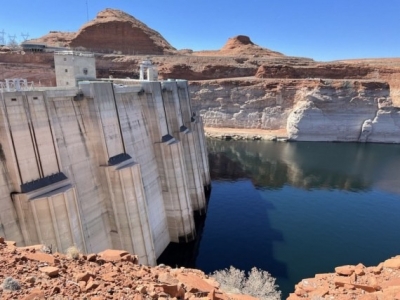Washington, April 5 : Lake Powell, the second-largest reservoir in the US, has seen a slight rise in water level after hitting its lowest since the first filling in the 1960s.
Lake Powell, located in northern Arizona and stretches up into southern Utah, offers water and power to millions of people in several states including Arizona, Colorado, Nebraska, Nevada, New Mexico and Utah, reports Xinhua news agency.
The lake is fed by the Colorado River.
Warming temperatures and abnormally dry conditions have cut into the river’s supplies.
The massive reservoir dropped to a historic low of 3,520.46 feet on March 13 as a climate-fuelled megadrought continues in the US West, according to data from the Bureau of Reclamation.
Lake Powell is down 1.22 feet from one year ago, according to the website of Lake Powell Water Database.Currently the lake is 178.15 feet below Full Pool.
Conan John, a captain of Lake Powell Experience which offers lake excursion, told Xinhua that water has been low in the last few years, but with the low water levels there is still a lot of Lake Powell that can be seen and viewed by boat.
Boat launching has been limited with water levels dropping below original boat ramps use, John said.
Eric Balken, executive director of the environmental advocacy group Glen Canyon Institute, said Lake Powell would likely be “well below” minimum power pool by now if not for the emergency releases.
Recently, the reservoir saw more water flow into the lake than out of it, resulting in just under half a foot of rise in water levels.
The increase is the first sustained gains the lake has seen since May of last year, according to local television KPNX.
The historically high amounts of rain and snow that the US Southwest has received over the past winter may have kickstarted Lake Powell’s seasonal uptrend very early, according to KPNX.
The US West is in the midst of its worst megadrought in 1,200 years, and the climate crisis has made the drought 42 per cent more extreme than it would have been otherwise, according to data of the World Economic Forum.
#reservoir #level #historic #Washington #Washington







